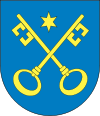Ciechanowiec
| Ciechanowiec | |||
|---|---|---|---|

City center
|
|||
|
|||
| Coordinates: 52°41′N 22°30′E / 52.683°N 22.500°E | |||
| Country |
|
||
| County | Wysokie Mazowieckie | ||
| Gmina | Ciechanowiec | ||
| Area | |||
| • Total | 26.01 km2 (10.04 sq mi) | ||
| Population (2006) | |||
| • Total | 4,898 | ||
| • Density | 190/km2 (490/sq mi) | ||
| Postal code | 18-230 | ||
| Website | http://www.ciechanowiec.pl | ||
Ciechanowiec (Polish pronunciation: [t͡ɕɛxaˈnɔvʲɛt͡s]; Yiddish: טשעכֿאַנאָװיץ) is a small town in Wysoczyzna Drohiczyńska, Gmina Ciechanowiec, Wysokie Mazowieckie County, Podlaskie Voivodeship, Poland.
Alternate names used in the past or currently include Rudelstadt (German), Tshekhanovits (Yiddish) and Tsekhanovets (Russian).
In the sixteenth century the city belonged to the Kiszka family. In the mid-sixteenth century Castellan of Trocki, Piotr Kiszka built a castle on the right bank of the river Nurzec, northeast of the town. Between 1617-1642 Mikołaj Kiszka ordered to build heavy defensive walls around the fortress, but soon the castle burned down during the Deluge, and the surviving buildings with the newly built residence for the Ossoliński family were later blown up and destroyed by the Russian Army in 1915. To this day only the foundations and the moat still exist.
The forthcoming owners of the city were: The Bremmer, Ossoliński, Szczukow and Ciecierski families. In particular, the Ossoliński family in the second half of the seventeenth century invested in the development of the city.
In the years 1736-1739 a brick church of the Holy Trinity and the Sisters of Mercy hospital was built, according to the draft of Warmia's architect Jan Adrian Kluk. His son, Fr. Jan Krzysztof Kluk (1739-1796), the local parish priest, devoted to natural history, became one of the most important Polish naturalists of the Enlightenment. He is the author of the first comprehensive textbook in the Polish language on agriculture, as well as other pioneering scientific topics, as well as school textbooks written on request of the Commission of National Education. The scope of the research included both botany and zoology, and natural pharmaceuticals. For his contribution to Polish science, he was honoured by King Stanisław II August and the University of Vilnius awarded him with an honorary doctorate.
...
Wikipedia



